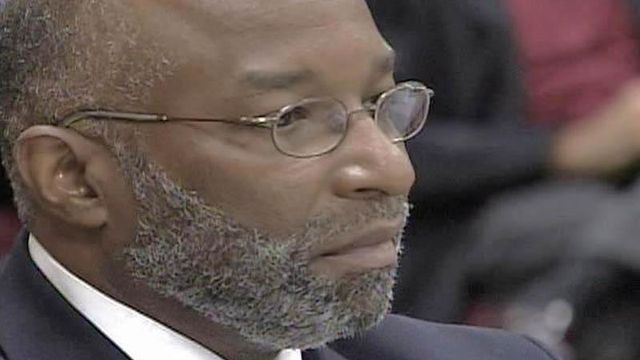Elections Board Refers Wright Findings to DA
The State Board of Elections has voted unanimously to hand over its findings in its investigation of state Rep. Thomas Wright to the Wake County district attorney.
Posted — UpdatedThe board held a public hearing Tuesday to examine "potential violations" of state campaign finance laws. Those instances were identified during a probe that began five months ago.
Wright, D-New Hanover, once a close ally of convicted former House Speaker Jim Black, has denied deliberately hiding information from state regulators about money donated to his campaign. He refused to testify before the board.
State Board of Elections Chairman Larry Leake said there appeared to be evidence that Wright mixed campaign donations with personal money and failed to file accurate campaign finance reports. During the hearing, testimony also suggested Wright appeared to have misused campaign money.
"I have not seen worse," Leake said after the hearing, noting that Wright has a history of filing late campaign finance reports. "He continues not to comply with our campaign finance laws."
The board initiated the investigation following a former Democratic consultant's allegation in December that Wright and his campaign broke elections law by delaying the disclosure of $41,000 in campaign donations.
The board is also looking into more than $119,000 that political committees reported giving to Wright's campaign since 1992, but that the campaign didn't identify receiving.
The Wake County District Attorney's Office can review the findings and conduct its own investigation to determine if any criminal charges are warranted.
During Tuesday's hearing, board investigator Kim Strach testified that Wright kept at least four bank accounts that mixed personal money with political contributions. Wright disclosed only one account to state regulators, she said.
The accounts took in $472,772 in campaign donations between 2000 and 2006, but generated only $229,548 in campaign-related expenses, according to bank records. The difference -- more than $240,000 -- seems to have been diverted to personal uses, including food, gas and lingerie, Strach said.
"It appears that he was expending a whole lot of money off of limited income," Leake said.
Strach also said the accounts contained $9,000 from three corporations that donated money to a community health foundation that Wright chaired. Using corporate donations for political purposes is illegal in North Carolina.
Before Tuesday's hearing, state elections director Gary Bartlett had said Wright and his attorney were cooperating with the investigation. When called to testify Tuesday, however, Wright declined and invoked his Fifth Amendment right to protect himself against self-incrimination.
Torlen Wade, the director of the state Office of Rural Health Development, also declined to testify, saying he wanted to learn more about the case before agreeing to speak.
Wade wrote a letter in March 2002 to help a community health foundation operated by Wright obtain a loan to buy a piece of property, according to Strach. The property was to be developed for a museum to remember the 1898 Wilmington Race Riot.
Wade had regular contact with Wright, who served as chairman of a House health committee, and Strach testified that he later told her he regretted writing the letter. The letter suggested $150,000 in state financing would back the museum project, she said, when both Wade and Wright knew that wasn't the case.
Meanwhile, Wayne Loften, whose family sold the property to Wright's foundation, expressed frustration Tuesday at being dragged into the investigation and all of the media coverage.
"What you did to us in those articles, you might as well have had a Gatling gun and the noose to come out and witch-hunt and try to destroy me and my family's credibility," Loften told Wright.
The property was foreclosed on after the foundation failed to pay the mortgage.
The elections board did hear testimony from Karen Davis, a former co-treasurer from Wright's campaign, who said she reviewed but couldn't recall signing three campaign checks made out to Wright personally in the fall of 2002. The checks totaled $2,800.
The campaign's other co-treasurer, Davis' ex-husband Daryle Parker, testified that Wright controlled most of the campaign's finances. Parker said he wrote some checks and collected contributions for the campaign, but never received cash or corporate contributions on behalf of Wright's campaign.
Neither Davis nor Parker still act as the campaign's treasurer.
Strach testified that Wright kept four accounts in his name or in the campaign's name that accepted campaign contributions, but Wright only disclosed one account that handled the transactions. The accounts commingled personal and political funds, including nearly $9,000 from three corporations that donated money to the community health foundation, she said.
Using corporate donations for political purposes is illegal in North Carolina.
The board subpoenaed testimony from Wright and five Wilmington-area residents who have links to his campaign, his work with the health foundation or the museum effort.
Joe Sinsheimer, the consultant who filed a complaint against Wright, accused the lawmaker of hiding money donated by several people linked to Sims Group USA. The company wanted to build the Hugo Neu landfill in Navassa -- a controversial issue leading up to Wright's 2006 primary campaign.
"I think we're looking at a very serious matter there, probably much more serious than the original campaign finance violations," Sinsheimer said of the possible bank fraud case against Wright in connection with the Wade's letter in support of the property purchase.
Sinsheimer operated a Web site for about a year that focused on the legal and ethical questions surrounding Black, who in February accepted plea agreements in state and federal court for corruption-related crimes.
Wright had been a political ally of Black and signed a letter in January praising his eight years as speaker, particularly for his efforts at placing minorities in leadership roles.
• Credits
Copyright 2024 by WRAL.com and the Associated Press. All rights reserved. This material may not be published, broadcast, rewritten or redistributed.





